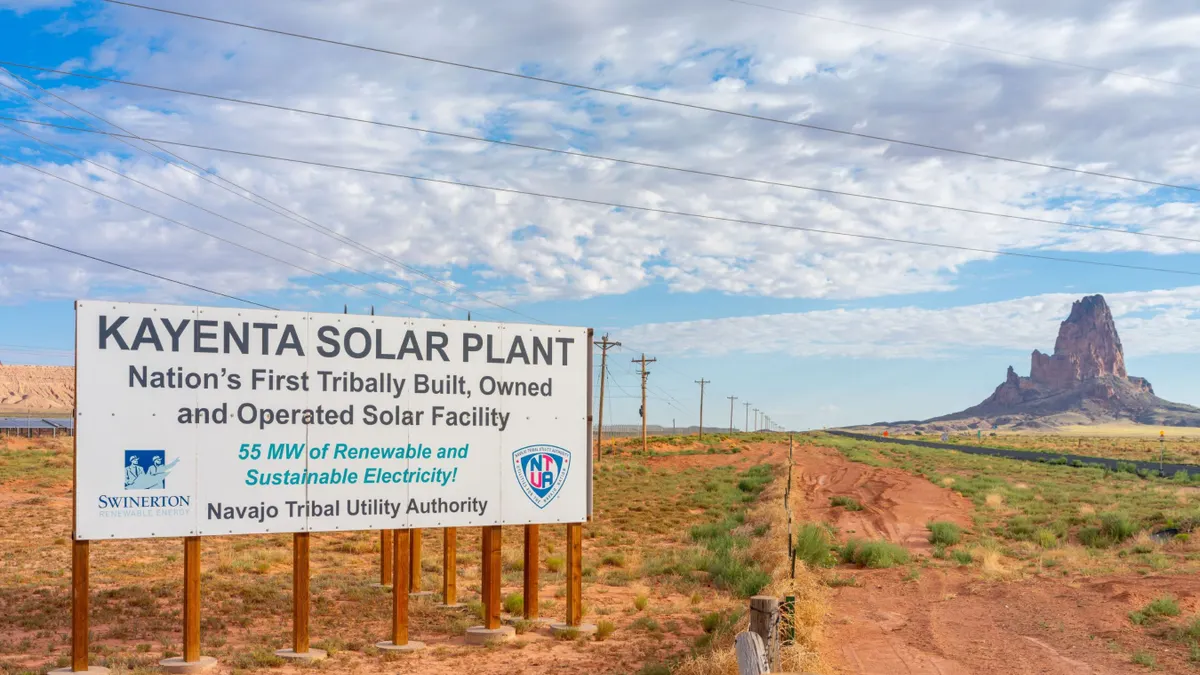A Republican-sponsored bill passed in Arkansas this week is seen as a major boost for solar power as it will allow third-party financing and increase project size limits in the state.
The bill received overwhelming bipartisan support, passing the Senate 28-2 and the House 83-5, both of which hold large Republican majorities.
How did the state manage it?
There was a "very compelling business case" for the bill, driven in part by Walmart, which is headquartered in the state and has a renewables goal of 50% by 2025, according to Gary Moody, interim executive director of Audubon Arkansas who worked closely with stakeholders on the bill.
As in other states that don’t allow third-party solar financing, such as Wisconsin and Florida, the bill was met with hostility from utilities until concessions were made on both sides, bringing utilities in the state to a "neutral" position, Moody told Utility Dive.
"Originally, this was a very simple, two page bill that just dealt with the two issues, adding third-party finance options and increasing the size cap from 300 kW to 1 MW, and then through the negotiation process it became the [10 page] bill that you see now," he said.
Third-party dilemma
Third-party financing allows solar leasing and power purchase agreements. In states like Arizona, Colorado and California, third-party agreements have led to the procurement of approximately 80% of residential solar systems, as of 2016 according to Center for the New Energy Economy.
The method has become particularly lucrative as costs for solar continue to fall and business and residential interests increasingly see solar as a viable energy option.
"I think it's not surprising when we see utilities come out against some of these policies that are going to break down those barriers and make it easier for people to choose alternatives."

Katie Ottenweller
Southeast director, Vote Solar
However, in the few states where third party financing isn't enabled, utility opposition often drives lack of policy movement.
"A lot of that really goes back to just the need to realign the utilities' incentives, especially when it comes to customers making their own choices and going out in the free market and taking advantage of something like rooftop solar or opportunities for large companies to develop solar projects in a way that's more cost competitive than utilities," Katie Ottenweller, southeast director at Vote Solar, told Utility Dive.
"Those things are going to be viewed as threatening to a monopoly that is used to having a captive customer base and no competition. So, you know, I think it's not surprising when we see utilities come out against some of these policies that are going to break down those barriers and make it easier for people to choose alternatives."
Compromise in Arkansas
In order to get the majority vote needed, those who worked on the bill felt they needed to get to a place where they knew utilities at least "weren't going to fight it," Arkansas Senator David Wallace, R, who sponsored the bill, told Utility Dive.
"It was a seven week journey and the first day there were about 30 angry people," utilities on one side, solar developers on the other "both dug in pretty hard," he said. "The big utility companies and solar folks don't get along really well together, at least not yet."
Concessions included modifications under the definition of what it means to be a "net metering customer," which was originally defined as an owner of a net metering facility, but qualifications were added under leasing limitations.
"Basically, the lease can't be a PPA that says it's a lease, and then for our non-taxed entities we made solar service agreements an option," said Moody.
"As it was originally written, it would have allowed leasing, it would have allowed PPAs, basically no restriction in terms of ownership or financing and so that language was the result of a compromise."
Lawmakers also conceded on a net metering compensation docket that has been debated for three years in the state.
"Utilities are wanting to move away from net metering to a two channeled billing system and solar advocates were obviously arguing to retain net metering," said Moody. "We kicked all of that back to the commission in this bill so that question is still unsettled, but we were able to put in clauses to keep net metering for any demand customers."
As solar policy grows in complexity, stakeholders face "big questions," said Ottenweller. "To some extent, the demand for clean energy is very simple, right? But energy policy and sort of operating within the existing landscape is complicated."
States like Georgia and South Carolina faced similar challenges to lowering barriers in recent years, she said, and in both cases, policy started off simple and grew more complicated as stakeholders weighed in.
"But I think the end result of that process of sitting down at the table with utilities, understanding what their interests were ... and then taking the time to work toward solutions where we could find common ground, I think that process is incredibly important for opening up markets and then continuing to see them grow over time," she added.
"I'm a Republican. I'm not a jump-up-and-down, talk about renewable energy, but this makes sense and it's going to get better."

David Wallace
Republican State Senator
Arkansas could use some more "wiggle room in the rates" in the future, said Wallace. "Solar ... gave more than their share, but it was something we had to do.
Lowering market barriers for state growth
"Arkansas consistently gets rated near the bottom when it comes to solar policy, or ranked near last among states in terms of solar jobs, but yet we have really pretty good solar potential here and what we targeted with this legislation were two regulatory barriers that were preventing the market from reaching its full potential," said Moody.
Walmart was one of the big coalition partners on the bill. The retail supplier had been installing solar across other states, but its preferred method is to lease solar in chunks of at least 1 MW at a time, so project caps and leasing limitations made that difficult in the state. Corporate interest is a major driver of state interest in renewables, particularly in red states with strong renewable resources like Kansas, Iowa and the Dakotas.
Jobs are a major consideration in terms of economic growth, and lowering market barriers is a compelling case to the right side of the political aisle, said Moody.
"I'm a Republican. I'm not a jump-up-and-down, talk about renewable energy, but this makes sense and it's going to get better," said Wallace.
"There's more technology coming. We are on the verge of having affordable batteries that will let us store our solar power. It's not going to be a replacement for fossil fuel, at least not now, but, but we need to go down that road and we need to develop it."






















